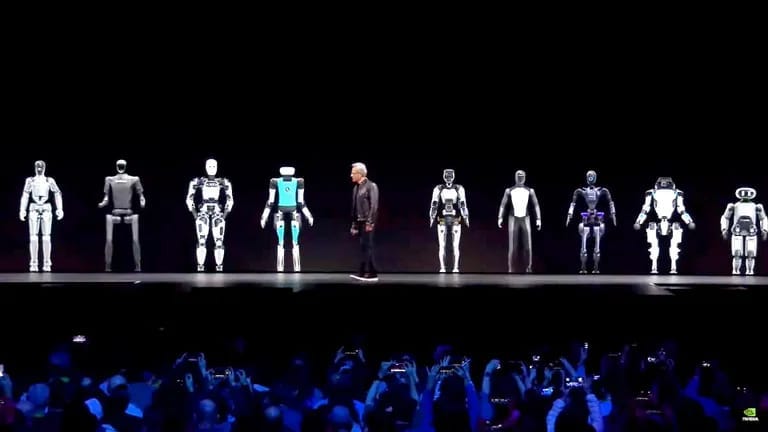Suno AI creates music that feels like it has soul.
Open Interpreter launches a voice device to control computers, Nvidia hogs headlines with robots and powerful new GPU, Blackwell.
Happy Friday. There’s so much happening in AI that it can feel overwhelming to keep up. We curate the most significant moves in AI and the future of creativity that happened this week, so that you can separate signal from noise.
We are trying out a new format —designing the newsletter around two principles: curation and context. Let us know what you think!
One.
Wow. This is the first generative music that feels like it actually has soul. Created by Suno AI, a two-year-old music model company founded by Harvard physicists, the model generates music from text prompts. I asked Suno to make an opening theme song for an upcoming podcast about the future of creativity (yes, coming soon!) and a song that would go viral on Tiktok.
It delivered.
In an interview with The Rolling Stone, cofounder Mikey Shulman said that the fact that music listeners so vastly outnumber music-makers at the moment is “so lopsided”, and instead, dreams of a world where billions of people can make music whenever they want to.
While primarily a text-to-music interface, Suno wants to design more advanced and intuitive interfaces to music-making, like generating songs based on users’ own singing.
Two.
A voice interface to control computers
Open Interpreter — the Linux of AI— launched the 01 Light, a portable voice interface that controls your home computer. Through voice commands, 01 can use your apps, create and edit photos, videos, control a Chrome browser to perform research, analyze large datasets and even learn new skills.
The best part? While the 01 Light goes for $99, the Interpreter, the software that uses LLMs to run code to perform tasks, is completely open source and free to use. In two quick steps, I had it up and running on my computer and it sent an email on my behalf.
Three.
NVIDIA hogged headlines this week with key announcements at its GTC conference. They revealed Blackwell, the ‘world’s most powerful chip’ for AI, and Project Gr00t, a multimodal AI to power humanoid robots, performing tasks like walking, talking, and performing tasks like mixing up mocktails at the mega conference in San Jose this week. Nvidia says Blackwell can deliver up to 30x more inference throughput than previous GPUs all while using less energy, and is a double-chip monster that can handle complex generative AI tasks without breaking a sweat.
Image Credit: CNN
Quick Hits
Stability AI releases Stable Video 3D, which can turn images into 3D meshes. The new feature runs up against competitors like Runway and Pika Labs, except that it is both open-source and offers an API, making it super developer-friendly.
Anthropic releases Claude 3 Haiku, an AI model built for speed and affordability. X user Matt Shumer says that if given small tasks, Haiku will often outperform Claude 3 Opus, and far outperform GPT-4 “at a fraction of the cost, with blazing fast speeds”.
Roblox introduces new features in its Studio: “Avatar Auto Setup” simplifies the process of creating avatars from days to minutes; and “Texture Generator” enables creators to quickly change the look of 3D objects using a text prompt.
Google DeepMind shares an update on SIMA, a game-playing AI agent capable of understanding and acting on natural language instructions in virtual worlds. Imagine asking it to pick an apple, or shoot down a target, just through voice or text, instead of a game controller.





